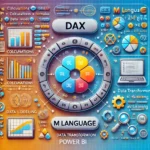BigQuery vs. Big Data for Efficient Data Processing
In a world driven by data, managing and processing large datasets is a challenge that organizations continuously face. With the ever-growing complexity and volume of data, robust solutions are required. Google BigQuery and traditional Big Data technologies stand out as two prominent options. In this article, we’ll delve into a comprehensive comparison table to help you understand the pros and cons of both approaches.
Understanding BigQuery
Google BigQuery serves as a cloud-based data warehouse, leveraging the processing power of Google’s infrastructure to execute lightning-fast SQL queries. It’s a fully managed service, allowing organizations to concentrate on data analysis without dealing with server management.
Navigating Big Data
Big Data involves the processing of massive and intricate datasets that conventional databases struggle to handle. This realm encompasses technologies like Apache Hadoop, Spark, and NoSQL databases, enabling organizations to process, store, and analyze data at an extensive scale.
https://synapsefabric.com/2023/08/19/bigquery-vs-postgresql-unveiling-the-clash-of-data-management-titans/
A Detailed Comparison: BigQuery vs. Big Data
| Aspect | Google BigQuery | Big Data Technologies |
|---|---|---|
| Scalability | Seamlessly scales without requiring manual steps. | Demands manual configuration for effective scaling. |
| Ease of Use | Offers an intuitive interface with familiar SQL. | Requires a steeper learning curve due to diversity. |
| Processing Speed | Executes queries at exceptional speed using Google’s resources. | Processing speed hinges on cluster setup. |
| Setup and Management | Fully managed service, eliminating infrastructure setup hassles. | Involves setup, configuration, and ongoing management. |
| Cost Structure | Follows a pay-as-you-go model based on processed data. | Entails infrastructure costs along with possible licenses. |
| Data Types | Primarily caters to structured data. | Accommodates structured, semi-structured, and unstructured data. |
| Flexibility | Ideal for ad-hoc queries and interactive analysis. | Flexible but necessitates thoughtful design for efficiency. |
| Use Cases | Well-suited for data exploration and business intelligence. | Encompasses a wide range: batch processing, real-time analytics, etc. |
| Ecosystem | Integrates with select Google Cloud services. | Boasts a vast ecosystem comprising tools and frameworks. |
| Security | Offers robust security features and compliance options. | Requires meticulous security configuration. |
| Maintenance | Demands minimal maintenance efforts. | Entails regular maintenance and updates. |
The choice between Google BigQuery and traditional Big Data technologies hinges on factors such as your organization’s specific needs, familiarity with technology, budget constraints, and performance demands. BigQuery provides a managed and user-friendly avenue for businesses seeking SQL-based analytics prowess without the complexities of infrastructure management. Conversely, Big Data technologies offer a more customizable route, suitable for diverse processing requirements, but they necessitate hands-on management.
In the rapidly evolving tech landscape, it’s essential to assess the changing dynamics and the unique demands of your data processing tasks before reaching a decision. Whether you opt for the speed and simplicity of BigQuery or the adaptability of Big Data, both avenues offer valuable tools to unearth insights from your data treasures.






